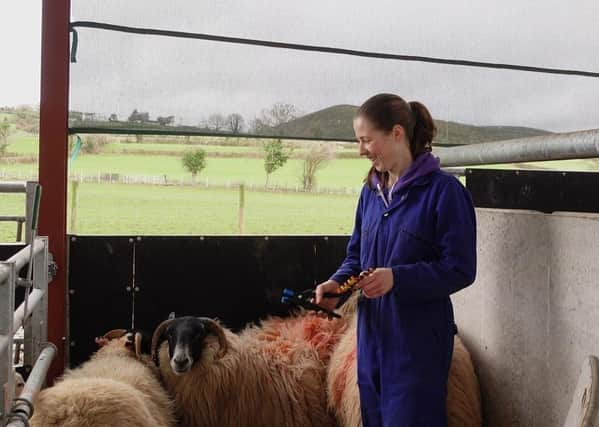Hill farmer values the benefits of Countryside Services sheep EID tags


The farm has been managed by the family for over three centuries and currently comprises 70 acres of farmland.
The 30 suckler cows and 300 breeding ewes are also grazed on common hill ground on the nearby Knockshee Mountain, locally known as Killowen Mountains.
Farm description
Advertisement
Advertisement
Rachel comments: “We run Perth Blackface Ewes and Blackface Cross Texel Ewes as we need a hardy breed in a hill area (LFA). These ewes do very well in the hill environment and scanned this year at 180% lambing rate. We farm with traditional cattle also and use Highland cross Shorthorn cows. The cows graze the hill and only come home at calving and bulling times. We run both ewes and cows on a low-cost system which we find produces more profit for us than higher cost intensive systems. We originally had continental cows, but our experience was that these could not cope on the hill ground and left very little profit, due to higher feed and animal health costs.
“In 2009, my father, a neighbour and I toured around Scotland and, having looked at different breeds, we decided to purchase Highland Cross Shorthorn heifers. These have proved a great success for us and are definitely more profitable than the continental breed cows we kept previously.
“We previously used a Shorthorn terminal sire on the cows and found that they produced excellent calves which thrived very well for us. We are now using an Aberdeen Angus terminal sire, with bull calves being sold on and the heifers retained as herd replacements.
“Suckler cows are grazed on the hill until six weeks before calving in January, when they are housed and fed on grass silage with a small amount of concentrate feed. Cows and calves go back onto the hill in June, once cows are confirmed in calf.
Advertisement
Advertisement
“Ewes are lambed indoors and fed silage and a high protein concentrate prior to lambing.”
Rachel comments: “We try to make the best silage we can for the ewes in order to reduce concentrate costs. Our silage is analysed every year, but we still believe in feeding the best concentrate available, so we use a 20% protein high energy and soya nut. We find that this ration helps to ensure that ewes produce good quality colostrum for the lambs.”
Sheep tagging and identification
Having tried a range of tag types over the years, Rachel and her father now only use cattle and sheep tags supplied by Countryside Services.
Rachel comments: “We use EID Button tags on all our ewes and replacements as we have found that they have excellent retention and reading. We have used several different tags on the market and had no end of problems with lost tags. This costs us more money and time. Previously we also had problems with ewes’ ears becoming infected with some of the tags we used. We have not had this problem since we changed to sheep tags supplied by Countryside Services.
Advertisement
Advertisement
“The bottom line for us is that we need a tag that stays in and transponders that last for life. We really value the electronic identification system – we record all our ewes using an EID reader. Our medicine book is also updated this way. We scan any ewes which are injected with an antibiotic or any other health treatment - this saves us time with paperwork and also really improves the accuracy of recording. The main benefit for us in using the Countryside Services EID flexo button tags is that they without doubt save us time and money. Our replacement tag rate is zero at the minute, which a lot of people find hard to believe, but that is what it is for us. It leaves recording our stock a lot easier, as everything from the reader is transferred onto the laptop. It is a simple and easy process and hassle free.
“We definitely have much better flock records now, as the process is very straightforward. I also like the facility for DNA testing using the ear tag, and whilst we have not used it yet, I hope to use this on our pedigree Blackface ewes, as we have just recently joined a Blackface Society.
“For store lambs we use Countryside Services electronic and visual foldover tags as they have a sharp and strong pin on the end and are quick and easy to attach to the lamb’s ear. With the electronic foldover tag there is also a 360 degree readability giving us an accurate read from all angles. These foldover tags are put in lambs we are selling, and we have been very pleased with them.”
Ear Tag Supplier
Rachel comments: “We purchase all our cattle and sheep tags from Countryside Services and I have been very pleased with the service that I have received – I particularly appreciate the quick turnaround time and friendly staff. We put all our management information on the sheep EID button tags for the ewes going to the hill and we have had great support from Countryside Services in uploading this information onto the system.”
Advertisement
Advertisement
Rachel also went onto say that the Caisley cattle tags supplied by Countryside Services are an excellent tag for retention. Rachel further highlights: “With our cows grazing on rugged hill ground, they tend to get the tags caught easily on briers. The frictionless rotation on the Caisley tags supplied by Countryside Services means we have excellent tag retention, saving us time and hassle plus the cost of the replacement tags.”
For more information on the full range of sheep and cattle tags provided by Countryside Services, you can get in contact by phoning 028 8778 9770 or emailing [email protected].